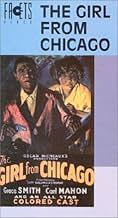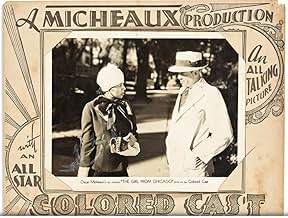An undercover government agent on a case in Mississipi meets and falls in love with a beautiful young woman who's being menaced by a local crime boss. He rescues the girl, and they leave Mis... Read allAn undercover government agent on a case in Mississipi meets and falls in love with a beautiful young woman who's being menaced by a local crime boss. He rescues the girl, and they leave Mississippi and head to Harlem, but their troubles follow them: they become involved in the m... Read allAn undercover government agent on a case in Mississipi meets and falls in love with a beautiful young woman who's being menaced by a local crime boss. He rescues the girl, and they leave Mississippi and head to Harlem, but their troubles follow them: they become involved in the murder of a local crime boss there.
- Norma Shepard
- (as Star Calloway)
- Wade Washington
- (as Frank Wilson)
- Gomez
- (as Uano Hernandez)
Featured reviews
The highlight for me was a little conversation around a table where one of the characters related a story about a black man being imprisoned on a trumped up charge so that he could be used as free labor, a second form of slavery that was highly relevant to the audience in 1932, and to some extent still true to this day. I also liked the shift to Harlem midway through the film, because the nightclub performances felt so much more authentic and breathed some much needed life into the film, but even they are not of a quality to make me recommend checking them out. It was very slim pickings here, and a tough way to spend 70 minutes.
Like most of Oscar Micheaux' sound films, I find it important but not very good. A great deal of its badness can be laid at the feet of a budget too small to sustain a good movie: no money to rent decent equipment, no money to rent studio space for long enough to manage set-ups, no money to take the time for rewrites and rehearsal. So the leads are awful. In fact, when you hear Frank H. Wilson speak, his naturalism gives you hope. But no one else has it. You may, if you wish, use this reason as an escape for its badness. I fear I don't. I'm afraid that people have to spend some time being bad before they can be good. They have to learn their craft, in this case, the craft of moviemaking.
I note that by this time Micheaux was a competent silent film maker. The exterior sequences at the beginning of the movie are well composed. But movie making had moved into the sound era, and Micheaux had to start all over again.
A patchy script and minimal production values can make the movie hard to follow. The sound track is typical of early talkies, with the actors stopping to talk at the camera.
Mainly interesting for the music and dance acts, especially the chorus line and the dance duo in a nightclub and as a view of the black acting style of the period.
Now I am not trying to be nasty and I do understand why the acting, direction and production values were horrible. At the time, black movie patrons in the US were often not allowed into white movie houses. So, they went to segregated theaters that either showed mainstream films or they would show black-produced films. BUT, the black productions simply had no funding and no real pool of talent because Hollywood wouldn't allow most of these folks to work as writers, directors and actors. So, historically speaking, this is an interesting film from Oscar Micheaux. But sloppy camera work, bad acting, the most god-awful singing in the history of film and a dull plot make this a serious chore to watch.
Did you know
- TriviaFilm debut of Juano Hernandez.
- GoofsAlonzo White tells Ballinger he's from the Department of Justice, specifically the Secret Service. The Secret Service is in the Treasury Departmentg.
- ConnectionsEdited into SanKofa Theater: The Girl From Chicago (2017)
Details
- Release date
- Country of origin
- Languages
- Also known as
- A Garota de Chicago
- Production company
- See more company credits at IMDbPro
- Runtime
- 1h 10m(70 min)
- Color
- Sound mix
- Aspect ratio
- 1.20 : 1



















